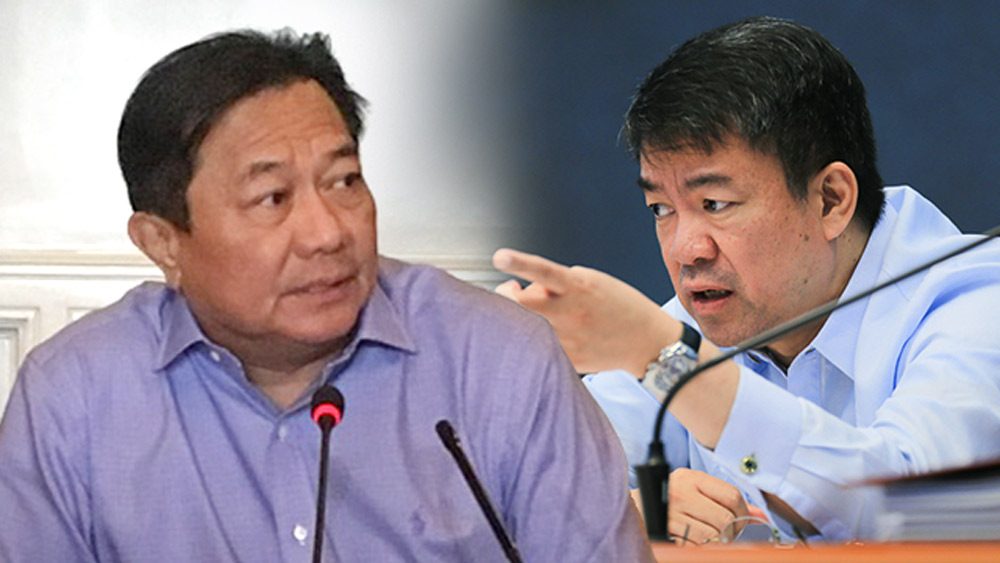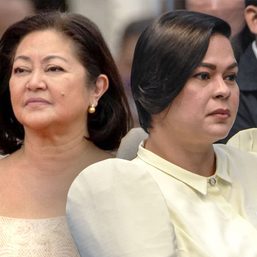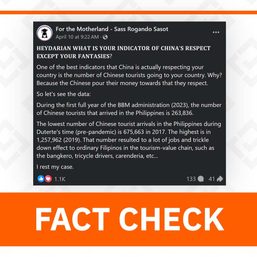SUMMARY
This is AI generated summarization, which may have errors. For context, always refer to the full article.

This compilation was migrated from our archives
Visit the archived version to read the full article.
Conclusion
(READ: Part 1: Are Duterte’s multi-million-peso intel funds achieving their purpose?)
MANILA, Philippines – Because actual expenses charged against intelligence and confidential funds are difficult to audit, it’s important for them to show they are achieving their desired objectives. Responsible agencies that are accountable for outcomes should be clear.
For starters, they have to be released in the framework of a peace and order and safety program, according to former Commission on Audit (COA) chairperson Grace Pulido Tan. Based on this, she said, auditors can then check if the funds were disbursed in accordance with that plan.
In previous interviews for the book, “The Enemy Within”, various auditors and budget experts stressed the need for Congress, which exercises general oversight over how the budget is implemented, to hold agencies accountable for outcomes promised on account of allocated intelligence and confidential funds.
During a hearing on the proposed 2017 budget, Senator Antonio Trillanes IV suggested that if the funds were to be used for the Duterte administration’s peace and order and anti-drug efforts, they should be allocated directly to intelligence and law enforcement agencies.
Senator Loren Legarda, the chair of the finance subcommittee which reviews the budget of the Office of the President (OP), approved the same on condition that Executive Secretary Salvador Medialdea submits the work and financial plan for these funds to the finance committee and to Senator Trillanes IV.
Trillanes at that time said that approval should be “with the understanding that this is conditional, that if such submissions won’t be satisfactory then we may make or propose amendments at the proper time.”
Funds vs performance
Both the Philippine National Police (PNP) and the Philippine Drug Enforcement Agency (PDEA) have claimed some measure of success. According to PDEA, some P18.9-billion worth of drugs have been seized since President Rodrigo Duterte’s drug war started.
Apart from this, the PNP and other law enforcement agencies also claimed to have killed 3,967 drug personalities and arrested 118,287 in a total of 79,193 legitimate anti-drug operations as of November 27. PDEA also said that 4,747 barangays have been declared drug-free.
But questions on how the President’s men have been gathering intelligence on the drug war suspects remain of paramount concern.
It does not help that the drug list – which the President said, included politicians, police, and members of the judiciary with alleged ties to the illegal drug trade – has been found to be riddled with errors. The PDEA and the National Bureau of Investigation have denied that they were the source of the list. (READ: Duterte narco list now 6,000 names long and counting – PDEA)
One potential use of intelligence funds is the purchase of information surveillance equipment which could be used by authorities to spy on big-time drug operations.
In oral arguments at the Supreme Court on the war on drugs in early December, Associate Justice Antonio Carpio – the most senior magistrate on the bench – grilled the PNP for seemingly “concentrating on street-level operations” and “practically ignoring the big-time drug lords.”
And then there’s the failure by concerned agencies to pin down the personalities involved in the smuggling of shabu worth P6.4 billion into the country in May 2017. (READ: Ombudsman creates panel to probe P6.4-billion smuggled shabu)
The law enforcement units were not the only ones who have been criticized for failure of intelligence. The defense establishment, which also got a significant boost in intel and confidential funds, likewise got criticized for its failure to anticipate terrorist movements which led to the Marawi attacks.
Need for oversight
It is critical to raise these questions because, save for a few exceptions, intel and confidential funds, after being introduced, are rarely reduced. After the lumpsum confidential and intel funds were added to the Office of the President during the tenure of former president Joseph Estrada, they got slight reductions but were never removed.
During the time of ex-president Benigno Aquino III, a decision was made to reduce the allocation levels for confidential and intelligence funds for the OP and to distinguish amounts allocated for each.
If this pattern holds, even if the Duterte administration merely retains its current spending level in the succeeding years of his term, it still stands to spend at least 4 times more for intelligence and confidential activities during its entire 6-year term than the Aquino administration.
In an ideal situation, it is Congress that should exercise oversight of intelligence funds. Before the budget was approved, members should have asked for expected outcomes from intelligence operations.
Yet, despite questions raised by some sectors over the huge intel funds of the OP, the House panel which was supposed to scrutinize the OP’s budget barely raised a squeak during the 2018 budget deliberations. They approved the OP’s budget in 3 minutes, no questions asked.
Even the opposition was generally complicit. When the OP’s budget for 2018 was presented to the Senate plenary, Senate Minority Floor Leader Franklin Drilon said they will not raise questions regarding the budget of the President’s office “out of inter-departmental courtesy.”
The graph below shows confidential and intelligence funds received by other departments and agencies since 2012.
Note: Amounts are in thousands of pesos. 2018 figures are based on the proposed budget, as reflected on the Budget of Expenditures and Sources of Financing (BESF). 2012 to 2017 figures are based on the annual General Appropriations Act (GAA) and the 2013 BESF (for 2012).
The bicameral conference committee has just finished deliberating on the proposed 2018 national budget. As expected, there was hardly any movement in these line items.
Clearly, the President will once again get the intelligence and confidential funds he wants. No questions asked. – Gemma Bagayaua-Mendoza, Michael Bueza, and Wayne Manuel/Rappler.com
Add a comment
How does this make you feel?



![[OPINION] ‘Some people need killing’](https://www.rappler.com/tachyon/2024/04/tl-some-people-need-killing-04172024.jpg?resize=257%2C257&crop_strategy=attention)

There are no comments yet. Add your comment to start the conversation.